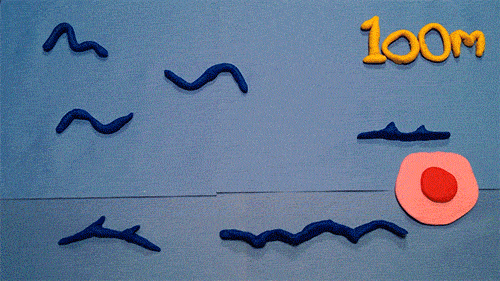First Sketch Of Copenhagen Suborbitals’ SPICA Capsule. They Aim To Be The First Amateur Organization

First sketch of Copenhagen Suborbitals’ SPICA capsule. They aim to be the first amateur organization to send a man to space.
via reddit
More Posts from Curiositytherover and Others
How Do You Stay Fit on a Mission to Mars?
This mini exercise device could be the key!
Onboard the International Space Station, astronauts need to work out to maintain their bone density and muscle mass, usually exercising 2 hours every single day. Throughout the week, they exercise on three different pieces of equipment–a bike, a treadmill and the Advanced Restive Exercise Device (ARED).

All these devices are needed to keep an astronaut healthy.
However, deep-space vehicles like our Orion Spacecraft aren’t as roomy as station, so everything — including exercise equipment — needs to be downsized. The Miniature Exercise Device (MED-2) is getting us one step closer to being able to keep astronauts’ bodies healthy on long journeys to the moon, Mars and beyond.

MED-2 is a compact, all-in-one exercise device that we developed and will be launching to the space station Tuesday, March 22. Onboard the station, we’ll see how MED-2 will perform in microgravity and how it will need to be further adapted for our Journey to Mars. However, it’s already pretty well equipped for deep space missions.
So what makes MED-2 so great for deep space travel and our Journey to Mars?
1. It is an all-in-one exercise device, meaning it can do both aerobic and resistive workouts. When we go to Mars, the less equipment we need, the better.

2. It’s incredibly light. The MED-2 weighs only 65 pounds, and every pound counts during space missions.

3. It has 5 - 350 pounds of resistance, despite weighing only 65 pounds. Astronauts don’t all lift the same amount, making the flexibility in MED-2’s “weights” essential.

4. It’s tiny. (Hence its name Miniature Exercise Device.) Not only is MED-2 incredibly light, but it also won’t take up a lot of space on any craft.

5. It powers itself. During an aerobic workout, the device charges, and then that power is used to run the resistive exercises. When traveling to space, it’s good when nothing goes to waste, and now astronauts’ workouts will help power the Journey to Mars.

MED-2 is only one of many devices and experiments flying on Orbital ATK’s Cygnus spacecraft. To find out more about the science on the space station, follow @ISS_Research and @Space_Station on Twitter.
Make sure to follow us on Tumblr for your regular dose of space: http://nasa.tumblr.com

Is the End of Daily Insulin Injections for Diabetes Sufferers in Sight?
A new study reportedly shows that boosting the immune system can safely restore insulin production for up to a year—which might make it possible for those who suffer with diabetes to not require daily injections. Notably, these are Phase 1 trials, which are designed to look at safety, not long term effectiveness. So much research is still needed.
Yet, if the technique proves viable and effective, this could change the lives of millions of people around the world. According to the Center for Diseases Control, in the United States alone, 29.1 million people (or 9.3% of the population) have diabetes. That’s one out of every 11 people. 371 million people worldwide have this condition.
To break down the research, those afflicted with Type 1 diabetes do not have enough T-regs or ‘peacekeeping’ cells, which is ultimately what causes the disease. Researchers from Yale and University of California have just showed that T-regs can be removed from the body, increased by 1,500 in a lab setting, and then placed back into the bloodstream as a way of potentially restoring the body’s insulin production back to normal.
Find out more at: http://futurism.com/links/end-daily-insulin-injections-diabetes-sufferers-sight/

The strange tale of the Snowflake Man
Wilson Bentley caused a flurry with his pioneering pictures of individual snowflakes, and his results are astonishing – so why was he seen as an oddball outsider?
4 Fun Facts Animated by Teachers
Last week, the TED-Ed Animation Team facilitated animation workshops with TED-Ed Innovative Educators. We introduced them to basic stop-motion tricks and techniques in hopes that they would begin to incorporate animation into their classroom projects - and based on the results, we think they are up to the challenge!
Earlier this fall, we sourced some fun facts from the educators themselves, and then tasked them with visualizing that very information. We used tablets with #istopmotion to shoot the animation, and basic household objects and school supplies as props and materials. We dare say that you, too, can do this from home!

1. When an object’s mass doubles, its kinetic energy also doubles, but when an object’s SPEED doubles, its kinetic energy quadruples.

2. If a male sperm was the size of a human being, it would swim the 100 metre freestyle in half of the world record time.

3. Approximately one word is added to the English language every two hours.

4. If you condensed the Earth’s history into 24 hours, humans wouldn’t exist until 11:58pm.


HOW DID I NOT KNOW THIS?!

NASA is Planning to Capture an Asteroid and Put it in Orbit Around the Moon
NASA is planning a mission that will visit a large asteroid and redirect a large portion of it into a stable orbit around the Moon. From there, we can study it at our leisure. http://futurism.com/videos/nasa-planning-capture-asteroid-put-orbit-around-moon/









If Our Universe Is So Old and Vast, Then Where Are All the Aliens?
Read more at: http://futurism.com/images/ http://futurism.com/images/if-our-universe-is-so-old-and-vast-then-where-are-all-the-aliens/
Typically the first question asked of new parents is, “Is it a boy or a girl?” But what is the brain biology behind sexual differences? Join Bridget Nugent, a researcher from the University of Pennsylvania, to learn about how sex differences are created in the brain.
Download this podcast or watch the video below:



Kryptos is an encrypted sculpture by the American artist, Jim Sanborn, that is located on the grounds of the Central Intelligence Agency (CIA) in Langley, Virginia. Since its dedication on November 3, 1990, there has been much speculation about the meaning of the encrypted messages it bears. Of the four messages, three have been solved, with the fourth remaining one of the most famous unsolved codes in the world. The sculpture continues to provide a diversion for cryptanalysts, both amateur and professional, who are attempting to decipher the final section. The sculptor has given clues on several occasions.
The solved messages can be read here: [x]
(Fact Source) For more facts, follow Ultrafacts







Brain, Bone and Blood Vessels Coming Hot Off the Press
Could the days of custom clavicles and bespoke bladders produced just in the knick of time for suffering patients be around the corner?
While keeping an eye on tissue engineering studies, we’ve been seeing some significant wins in the lab that are bringing the sci-fi future of on-demand 3-D printed organs, bone and blood vessels closer.
Harvard and Brown bioengineers are taking their own routes to build complex tissues in customized 3-D printers. And just the other week, we reported on newly unveiled work at the University of Florida to print complex soft structures in baths that could one day birth replacement human parts along with soft robots.
Now, Carnegie Mellon engineers reported on Friday that they had successfully printed simplified proof-of-concept anatomical structures like mini femurs, blood vessels and brains suspended in soft gelatin. Learn more and see a video below.
Keep reading
-
 meeshett reblogged this · 9 years ago
meeshett reblogged this · 9 years ago -
 inducedobe liked this · 9 years ago
inducedobe liked this · 9 years ago -
 wonderleah liked this · 9 years ago
wonderleah liked this · 9 years ago -
 houseaubernon liked this · 9 years ago
houseaubernon liked this · 9 years ago -
 kislebowszky liked this · 9 years ago
kislebowszky liked this · 9 years ago -
 nihil-est reblogged this · 9 years ago
nihil-est reblogged this · 9 years ago -
 the0phrastus liked this · 9 years ago
the0phrastus liked this · 9 years ago -
 spacetimewithstuartgary reblogged this · 9 years ago
spacetimewithstuartgary reblogged this · 9 years ago -
 green-grid liked this · 9 years ago
green-grid liked this · 9 years ago -
 rosesnakes liked this · 9 years ago
rosesnakes liked this · 9 years ago -
 clearexpertpolice reblogged this · 9 years ago
clearexpertpolice reblogged this · 9 years ago -
 space-shelter-blog reblogged this · 9 years ago
space-shelter-blog reblogged this · 9 years ago -
 jacquelinesantiago liked this · 9 years ago
jacquelinesantiago liked this · 9 years ago -
 guozp reblogged this · 9 years ago
guozp reblogged this · 9 years ago -
 guozp liked this · 9 years ago
guozp liked this · 9 years ago -
 pseudogonal liked this · 9 years ago
pseudogonal liked this · 9 years ago -
 schulsternwarte-bautzen-blog reblogged this · 9 years ago
schulsternwarte-bautzen-blog reblogged this · 9 years ago -
 e-n-t-p liked this · 9 years ago
e-n-t-p liked this · 9 years ago -
 susietwobruise reblogged this · 9 years ago
susietwobruise reblogged this · 9 years ago -
 fyenaid reblogged this · 9 years ago
fyenaid reblogged this · 9 years ago -
 fyenaid liked this · 9 years ago
fyenaid liked this · 9 years ago -
 xtarboy reblogged this · 9 years ago
xtarboy reblogged this · 9 years ago -
 lurodrisu liked this · 9 years ago
lurodrisu liked this · 9 years ago -
 susietwobruise liked this · 9 years ago
susietwobruise liked this · 9 years ago -
 thoths-foundry-blog reblogged this · 9 years ago
thoths-foundry-blog reblogged this · 9 years ago -
 the-telescope-times liked this · 9 years ago
the-telescope-times liked this · 9 years ago -
 the-telescope-times reblogged this · 9 years ago
the-telescope-times reblogged this · 9 years ago -
 avada-matata liked this · 9 years ago
avada-matata liked this · 9 years ago -
 frankiebawls-blog reblogged this · 9 years ago
frankiebawls-blog reblogged this · 9 years ago -
 curiositytherover reblogged this · 9 years ago
curiositytherover reblogged this · 9 years ago -
 soldier369 liked this · 9 years ago
soldier369 liked this · 9 years ago -
 ironside451 reblogged this · 9 years ago
ironside451 reblogged this · 9 years ago -
 ironside451 liked this · 9 years ago
ironside451 liked this · 9 years ago -
 zsirosdiszno liked this · 9 years ago
zsirosdiszno liked this · 9 years ago -
 justtoshowoff liked this · 9 years ago
justtoshowoff liked this · 9 years ago